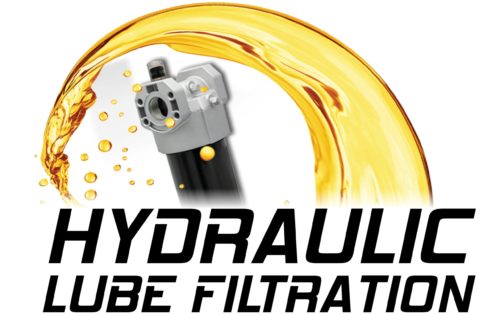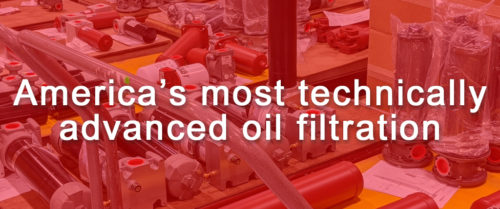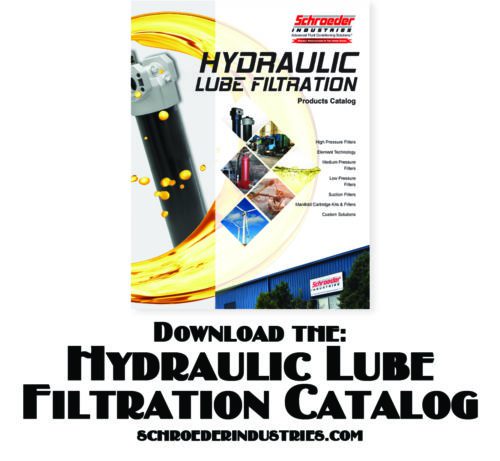Fluid Contamination Control: What You Need to Know
For a complete listing of Schroeder Industries’ Hydraulic and Lube Filters, click here.
Over 70% of all system failures are caused by contaminants in the fluid. Even when no immediate failures are apparent, high contamination levels can be present and sharply decrease hydraulic controls in the blink of an eye.
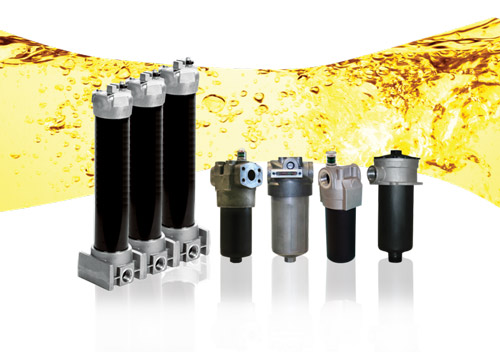
Contamination is defined as any substance foreign to the manufacturing equipment and damaging to its performance.
Contamination can exist as:
- solid
- liquid (i.e. water)
- gaseous (i.e. air)
- gel-like (i.e. oil degradation like varnish)
Watch on YouTube “Fluid Contamination Control: What You Need To Know”.
Solid contamination can lead to worn sealing surfaces and surfaces that cause leaking points for external air and moisture ingression and can also lead to friction-induced localized thermal degradation.
Solid contamination, generally referred to as particulate contamination, comes in all sizes and shapes and is normally abrasive to major components in the hydraulic system.
With this abrasive quality, a high contaminant level accelerates component wear and decreases the hydraulic supply and service life.
Worn components, in turn, contribute to:
- Inefficient hydraulic machine operation
- Seizure of hydraulic parts (such as hydraulic pumps, cylinders, and hydraulic motors)
- Higher fluid temperatures
- Leakage
- Loss of control
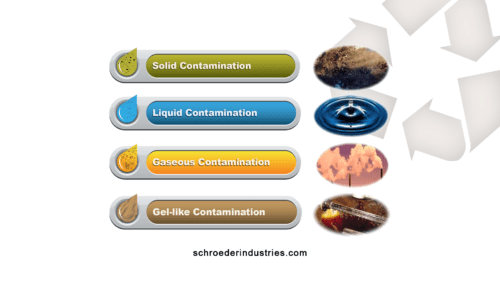
All these phenomena are a result of direct mechanical action between contaminants and machine components.
Aside from solid contamination, there are three (3) other types of contaminates responsible for fluid contamination. They are:
- Liquid contamination can accelerate the fluid aging process and generation of varnish or cause corrosive pitting of metallic components and therefore internally generate solid metallic particle contamination.
- Gaseous contamination can cause cavitation and dieseling effects which may lead to particle contamination and local thermal degradation.
- Gel-like contamination can be a root cause of accelerated aging, increased particle generation via changing and inadequate lubrication properties, as well as the formation of water from chemical reactions.
Contamination can also act as a catalyst to accelerate oxidation of the fluid and spur the chemical breakdown of its constituents.
What is Hydraulic and Lube Filtration?
Hydraulic and Lube Filtration is the perfect candidate for combatting issues with contaminates.
It will provide one of the only value statements you will ever need.
Schroeder Industries offers a full division of Hydraulic and Lube Filtration. With 75 years of manufacturing experience, there’s a solution for every facet of a hydraulic system, including:
- Top / Base Ported Filtration
- Manifold Mounted Filter Kits
- Hydraulic Tank Filters (In-Tank / Tank Top)
- Servo Protection Filters
- Tank-Mounted Suction Filters
- And more!
By utilizing filter technology for your operating fluid, it will remove many of the contaminates mentioned above and extend the life of the system components (also mentioned above).
Filtration groups, such as the ones shown in the photo located at the top of this page, do the job of making sure oil properties remain at their best.
The filtration process helps remove contamination from oil systems and conditions the fluid on a continuous basis. It also ensures the oil viscosity properties remain constant per the desired temperature ranges.
Find hydraulic parts near me
Watch on YouTube “The 7 Steps to Choosing the Correct Filtration”.
Schroeder Industries’ offers Hydraulic and Lube filter assembly types up to 6,500 psi (448 bar).
Using fluid technology, our hydraulic filter housings are continuously tested using the latest ISO (International Organization for Standardization) and NFPA (National Fluid Power Association) test procedures in our Fluid Care Center (FCC). Extensive testing is conducted to verify rated fatigue and burst pressures and to ensure compatibility with various mineral-based fluids.
For a complete listing of Schroeder Industries’ Hydraulic and Lube Filters, click here.







